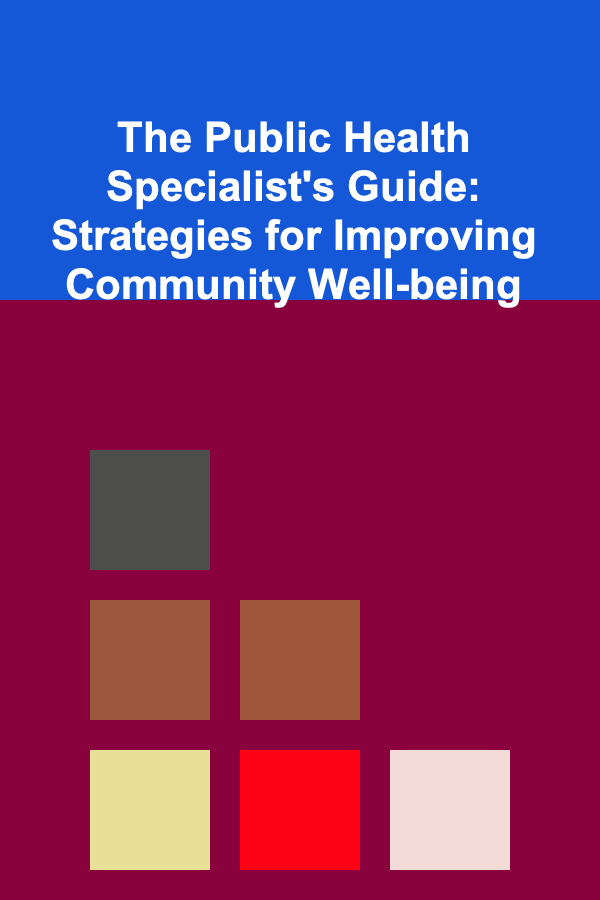
The Public Health Specialist's Guide: Strategies for Improving Community Well-being
ebook include PDF & Audio bundle (Micro Guide)
$12.99$10.99
Limited Time Offer! Order within the next:

Public health specialists play a pivotal role in shaping healthier communities. Their work spans a vast array of fields, from disease prevention to health promotion, policy advocacy to research, and from grassroots education to global health initiatives. With an ever-changing landscape of health challenges, from the rise of chronic diseases to global pandemics, public health specialists are tasked with developing comprehensive strategies that address both the immediate and long-term needs of communities.
In this actionable guide, we will explore a variety of strategies that public health specialists can use to improve community well-being, focusing on prevention, health education, policy, and system-level interventions.
Preventive Healthcare: The Foundation of Public Health
Prevention is the cornerstone of public health, as it reduces the burden of diseases and healthcare costs, while promoting a healthier, longer life for individuals within a community. Public health specialists must focus on both primary and secondary prevention strategies that reduce risk factors and promote early detection.
Primary Prevention: Addressing the Root Causes
Primary prevention aims to stop health problems before they start by addressing the root causes of illness. Public health specialists can implement a range of strategies to reduce risk factors and improve health outcomes, such as:
- Promoting Healthy Lifestyles: Encouraging physical activity, balanced diets, and healthy habits is key to preventing chronic diseases like heart disease, diabetes, and obesity. Community programs that promote walking, cycling, healthy eating, and tobacco cessation can have a significant impact on public health.
- Vaccination Programs: Immunization is one of the most cost-effective and impactful primary prevention strategies. Public health specialists must work to increase vaccination rates to prevent the spread of infectious diseases such as measles, flu, and COVID-19.
- Environmental Health Initiatives: Reducing environmental factors that contribute to illness, such as air pollution, water contamination, and unsafe housing, is crucial. Advocating for cleaner environments, better waste management, and improved sanitation can prevent numerous health problems.
Secondary Prevention: Early Detection and Intervention
Secondary prevention focuses on early detection and intervention, aiming to identify health problems at an early stage when they are more treatable. Public health specialists can implement strategies such as:
- Screening Programs: Regular health screenings for conditions like hypertension, breast cancer, and diabetes can help detect diseases before they become more serious. Public health specialists should advocate for accessible, community-based screening services.
- Health Risk Assessments: Providing individuals with tools to assess their personal health risks can empower them to make informed decisions about their health and seek preventive care.
Health Education and Community Engagement
Health education is a powerful tool in public health, as it equips individuals with the knowledge to make informed decisions about their health. Additionally, engaging communities in the process of health improvement fosters a sense of ownership and empowerment.
Developing Culturally Competent Health Education Programs
Health education initiatives should be culturally relevant, taking into account the diverse backgrounds and needs of community members. Public health specialists should:
- Understand Local Health Beliefs: Tailor educational programs to resonate with local customs, languages, and values. This helps ensure that information is accessible, relatable, and actionable for diverse populations.
- Collaborate with Community Leaders: Work with trusted local figures---such as religious leaders, teachers, and healthcare providers---to amplify health messages and build trust within communities.
Promoting Health Literacy
Health literacy is the ability to understand and act upon health information. Public health specialists should work to improve health literacy by:
- Simplifying Complex Health Information: Use clear, simple language and visuals to explain health concepts. This ensures that individuals can understand the risks, prevention methods, and treatment options available to them.
- Utilizing Multiple Platforms: Use a variety of communication platforms, including community workshops, social media, brochures, and radio broadcasts, to reach a wider audience.
Encouraging Behavioral Change
Effective health education should not only inform but also inspire action. Public health specialists must:
- Leverage Behavioral Science: Use techniques from behavioral science, such as goal-setting, motivational interviewing, and social norm theory, to support individuals in adopting healthier behaviors.
- Promote Peer Support: Creating peer support groups or community health ambassadors can increase motivation and create a sense of accountability within the community.
Advocacy and Policy Development
Public health specialists can influence the well-being of a community by advocating for policies that improve healthcare access, prevent health disparities, and promote healthier environments. Effective advocacy requires strategic thinking, strong communication skills, and the ability to build coalitions.
Advocating for Access to Healthcare
One of the most effective ways to improve community well-being is to ensure that all individuals have access to high-quality healthcare services. Public health specialists should advocate for:
- Expanding Healthcare Coverage: Work toward universal health coverage, ensuring that all individuals, regardless of socioeconomic status, have access to preventive care, treatment, and medications.
- Improving Healthcare Infrastructure: Advocate for the expansion and improvement of healthcare facilities, particularly in underserved areas. This includes everything from building new clinics to ensuring that existing healthcare workers have the resources they need to provide quality care.
Addressing Health Inequities
Health inequities are disparities in health outcomes based on factors such as race, income, geography, and education. Public health specialists should focus on:
- Identifying and Addressing Social Determinants of Health: Social determinants, such as poverty, education, and housing, significantly impact health outcomes. Public health specialists should advocate for policies that address these underlying factors.
- Targeting Vulnerable Populations: Work to ensure that marginalized groups, such as low-income individuals, people of color, and the elderly, have equal access to healthcare and social services.
Environmental and Public Health Policies
Policy changes at the local, state, and national levels can have a profound impact on public health. Public health specialists can advocate for policies that:
- Promote Clean Air and Water: Lobby for stricter environmental regulations to reduce pollution and protect natural resources.
- Improve Urban Planning: Advocate for urban designs that encourage physical activity, such as pedestrian-friendly infrastructure, parks, and bike lanes.
- Support Tobacco and Alcohol Control: Push for stronger regulations on tobacco and alcohol sales, advertising, and consumption.
Strengthening Public Health Systems and Partnerships
To create sustainable improvements in community well-being, public health specialists must strengthen public health systems and foster cross-sector partnerships.
Building Collaborative Networks
Public health improvements require a coordinated approach. Public health specialists should:
- Collaborate Across Sectors: Partner with organizations in fields like education, housing, transportation, and agriculture to address the multiple factors that influence health.
- Engage with Community-Based Organizations: Work with local nonprofits, faith-based groups, and volunteer organizations to extend the reach of public health programs.
Strengthening Health Workforce Capacity
A well-trained and adequately resourced public health workforce is essential for implementing effective health strategies. Public health specialists should:
- Invest in Workforce Training: Provide ongoing education and training for public health professionals to ensure they are equipped to handle emerging health challenges.
- Promote Workforce Diversity: Ensure that the public health workforce reflects the diversity of the communities it serves, fostering trust and improving the effectiveness of interventions.
Monitoring and Evaluating Public Health Interventions
To determine whether public health strategies are effective, continuous monitoring and evaluation are essential. Public health specialists should:
- Use Data to Guide Decisions: Collect and analyze health data to track the impact of interventions, identify emerging health threats, and adjust strategies accordingly.
- Conduct Outcome Evaluations: Evaluate the success of programs by assessing their impact on health outcomes, such as reductions in disease incidence, improvements in health behaviors, or increased healthcare access.
Implementing Evidence-Based Practices
Public health specialists should use evidence-based practices---those that have been proven effective through research and clinical trials---to guide their interventions. This includes:
- Evaluating the Latest Research: Keep abreast of the latest public health research and integrate it into practice.
- Using Community-Based Participatory Research (CBPR): Engage community members in the research process to ensure that interventions are culturally relevant and effective.
Conclusion
The role of a public health specialist is multifaceted and vital to improving community well-being. By focusing on prevention, health education, policy development, and system-strengthening, public health professionals can make a lasting impact on their communities. To achieve lasting change, it's crucial to adopt a collaborative, data-driven, and community-centered approach that addresses both the immediate and root causes of health problems. With the right strategies in place, public health specialists can foster healthier, more resilient communities for generations to come.

How to Build a Checklist for Reviewing Your Content's Call to Action (CTA)
Read More
How to Create a Safe and Comfortable Space for Your Pet at Home
Read More
How to Declutter Your Living Room and Keep It Organized
Read More
How to Establish a Daily Routine for Pet Care
Read More
How to Use Fairy Lights for a Magical Touch in Any Room
Read More
How to Use Website Testing Platforms to Make Money
Read MoreOther Products

How to Build a Checklist for Reviewing Your Content's Call to Action (CTA)
Read More
How to Create a Safe and Comfortable Space for Your Pet at Home
Read More
How to Declutter Your Living Room and Keep It Organized
Read More
How to Establish a Daily Routine for Pet Care
Read More
How to Use Fairy Lights for a Magical Touch in Any Room
Read More